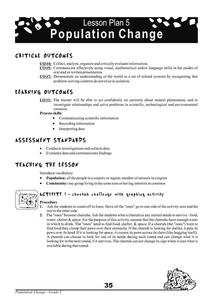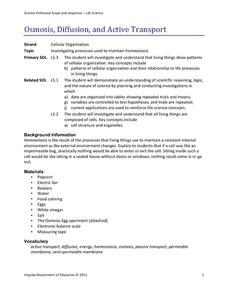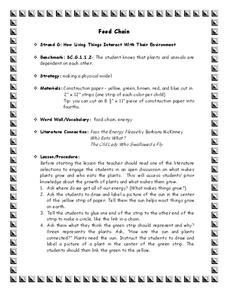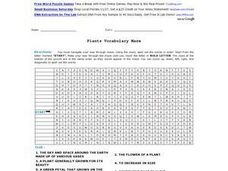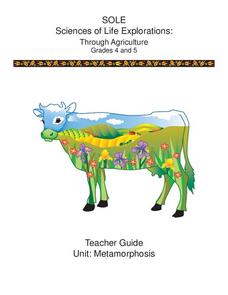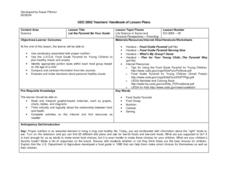Cheetah Outreach
Population Change
Your youngsters become cheetahs in search of food, water, shelter, and space in a fun physical game that does a fantastic job of representing fluctuating species population based on resources available over years.
Curated OER
Biological Molecules
Ninth graders examine the structure and function of biomolecules. In this food molecule lesson plan, 9th graders will examine various types of biomolecules such as carbohydrates, lipids, proteins, and nucleic acids. They will...
Curated OER
Cycling of Matter and Energy
These twenty various types of questions related to the cycling of matter and energy require students to match each definition in column 1 with the correct vocabulary term from column 2. Then, students explain what is being demonstrated...
Virginia Department of Education
Osmosis, Diffusion, and Active Transport
No, it really is okay to play with your food! Emerging scientists manipulate popcorn, eggs, and other household objects as they demonstrate multiple cellular processes. The activity, capable of modifications, is designed to reflect...
Curated OER
Food Sources
Students develop a working vocabulary of food by categorizing foods by their sources or origins. Working in groups, they determine at least four ways in which food is grown or produced. Groups create a poster by diving selected food...
Curated OER
Food Chain
Young scholars explore the cycle of how each living thing gets food. In this food chain unit, students participate in four lesson plans that highlight animal vocabulary, habitats, and the role of humans in our ecosystem. Young scholars...
Curated OER
Ecology: The Food Web
In this ecology worksheet, students match the vocabulary to the definitions, then represent producers and consumers by drawing a Pyramid of Numbers.
Curated OER
Food Chain
Students discuss what makes plants grow and who eats the plants. They are asked where do we get all of our energy? Students are asked to draw and label a picture of the sun in the center of the yellow strip of paper. They are explained...
Curated OER
Plants Vocabulary Maze
In this maze worksheet, students read the clues, spell the words in order, and navigate through the maze from start to the red letter s. Students solve 15 clues.
Foundation for Water & Energy Education
How Can a Dam Affect a River? Activity B
Second in a pair of activities, young ecologists continue to examine the food pyramid of a freshwater ecosystem. They take a look at the food pyramid drawn in Activity A and consider what would happen if a reservoir was created on the...
Science Friday
Ugh, a Bug!
Young entomologists familiarize themselves with the physical characteristics of insects. Composed of two activities, each instructional activity involves your scientists tapping into their prior knowledge of bugs and making observations...
Cornell University
Metamorphosis
Looking for an insect unit that addresses multiple skill strategies? Young entomologists explore multiple life cycles of insects that go through metamorphosis. The brainteasers and mobile activity spark learner interest before guiding...
Learning Games Lab
Nitrogen in Fertilizer
Nitrogen is an essential element for productive farming. An interactive lesson explores the chemical makeup of different fertilizers and their corresponding nitrogen content. The interactive challenges individuals to complete...
Chicago Botanic Garden
Understanding the Greenhouse Effect
Dive into the power of the sun with a two-part lesson. Budding scientists model the greenhouse effect in a hands-on activity, and then participate in a skit that explores the earth's energy balances and what really occurs in the...
American Museum of Natural History
Dive Into Worlds Within the Sea
The ocean is a series of ecosystems within an ecosystem. Learners dive into an exploration of ecosystems in an interactive lesson. They identify connections between organisms by following leading prompts within the lesson. The resource...
Utah Education Network (UEN)
Utah Open Textbook: Biology
Curriculum resources can be expensive—but not this one. An online textbook offers informational text for a complete high school Biology course. Topics include energy flow, body system, genetics, and evolution.
Curated OER
Mealworms
Crawl into the world of the darkling beetle with this scientific investigation. Watch as the insects move through the larval, pupal, and adult stages of life, recording observations along the way. Discuss the necessities of life as young...
Curated OER
Let the Pyramid Be Your Guide
Students chart foods on the food guide pyramid and design nutritional food plans that include all the food groups.
Curated OER
Animals and Plants of BC's Rocky Shore: lesson 3
Young scholars create a mural of the food chain of the animals and plants of BC's rocky shore. In this food chain lesson plan, students also play a food chain matching game.
Curated OER
Economics: What Are Some Other Uses for Rice?
Sixth graders investigate ways rice is sold by creating a chart of the different rice foods. In this economics lesson, 6th graders examine their local food store and list at least 10 rice by-products in a class chart. Students discover...
Curated OER
Principles of Ecology
In this ecology worksheet, students will review 10 vocabulary words associated with the basic principles of ecology. This worksheet has 10 fill in the blank questions.
Scholastic
Study Jams: Symbiosis
Three types of symbiosis are explained: parasitism, commensalism, and mutualism. This is done with colorful animation and lively dialogue in a straightforward and easy-to-follow manner. Have your ecology class watch this at home and then...
Virginia Department of Education
The Effects of Heat and Acid on the Enzyme Catalase
How quickly do enzymatic reactions occur? Assist the class as they examine heat and pH change to determine the rate of chemical reactions using catalase as an enzyme. Watch them "glow" with excitement!
Curated OER
Genetically Modified Foods
Students explain what genetically modified foods are and how they are created. Students use appropriate vocabulary to describe and effectively discuss the benefits of, and potential risks of, genetically modified foods.
